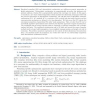Free Online Productivity Tools
i2Speak
i2Symbol
i2OCR
iTex2Img
iWeb2Print
iWeb2Shot
i2Type
iPdf2Split
iPdf2Merge
i2Bopomofo
i2Arabic
i2Style
i2Image
i2PDF
iLatex2Rtf
Sci2ools
149
click to vote
SIAMIS
2010
2010
Optimization by Stochastic Continuation
Simulated annealing (SA) and deterministic continuation are well-known generic approaches to global optimization. Deterministic continuation is computationally attractive but produces suboptimal solutions, whereas SA is asymptotically optimal but converges very slowly. In this paper, we introduce a new class of hybrid algorithms which combines the theoretical advantages of SA with the practical advantages of deterministic continuation. We call this class of algorithms stochastic continuation (SC). In a nutshell, SC is a variation of SA in which both the energy function and the communication mechanism are allowed to be time-dependent. We first prove that SC inherits the convergence properties of generalized SA under weak assumptions. Then, we show that SC can be successfully applied to optimization issues raised by the Bayesian approach to signal reconstruction. The considered class of energy functions arises in maximum a posteriori estimation with a Markov random field prior. The assoc...
Related Content
| Added | 21 May 2011 |
| Updated | 21 May 2011 |
| Type | Journal |
| Year | 2010 |
| Where | SIAMIS |
| Authors | Marc C. Robini, Isabelle E. Magnin |
Comments (0)

